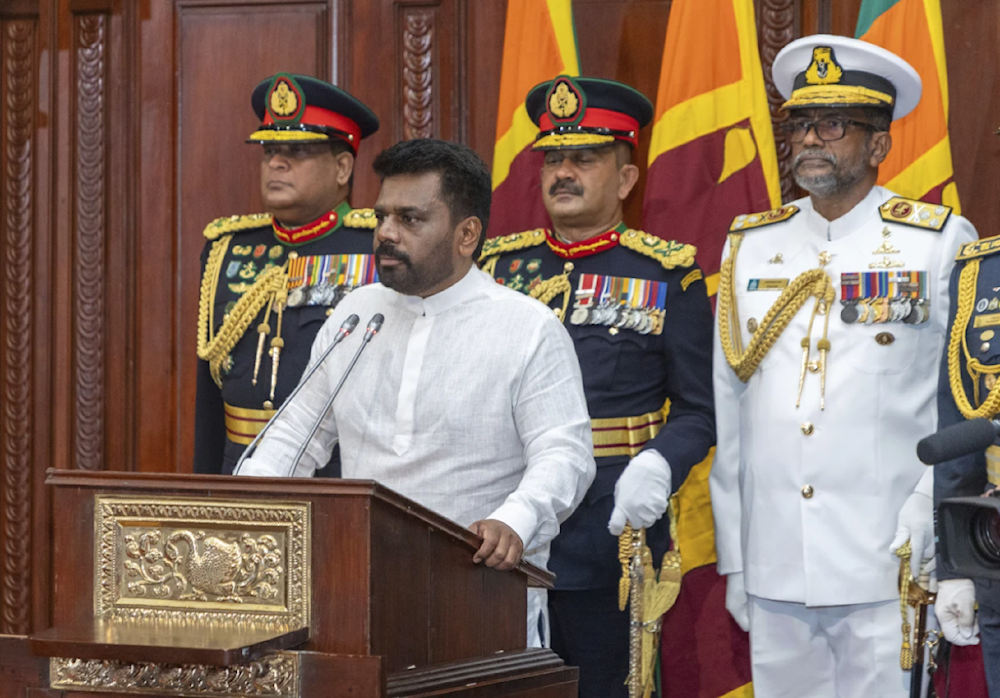Sri Lanka's new leftist leader dissolves parliament, calls elections
Anura Kumara Dissanayake disbanded the 225-member legislature late Tuesday, in which his once-marginal party had only three seats, and called an early election for November 14, over a year ahead of planned.
-

Commanders of the security forces stand behind as Sri Lanka's new president Anura Kumara Dissanayake addresses a gathering after he was sworn in at the Sri Lankan President's Office in Colombo, Sri Lanka on September 23, 2024.(AP)
Sri Lanka's new leftist president dissolved parliament on Tuesday and scheduled a quick election as he seeks to renegotiate the insolvent country's controversial IMF bailout agreement.
Sri Lankans elected Anura Kumara Dissanayake as their new President on Sunday, entrusting him with combatting corruption and strengthening the country's fragile economic recovery following its worst financial crisis in decades.
Dissanayake ran under the banner of the National People's Power alliance, which includes his Marxist-oriented Janatha Vimukthi Peramuna (JVP) party.
According to a notification in the official government gazette, he disbanded the 225-member legislature late Tuesday, in which his once-marginal party had only three seats, and called an early election for November 14, over a year ahead of planned.
The decree to dissolve parliament, whose term was set to expire in August, goes into immediate effect.
Despite being a small party, support for the 55-year-old Dissanayake's JVP increased during a 2022 economic collapse that impoverished millions of poor Sri Lankans and the agonizing implementation of the IMF rescue plan.
"We will have the smallest cabinet in the history of Sri Lanka," party member Namal Karunaratne told reporters on Tuesday.
Just before parliament was dissolved, the administration announced that Dissanayake would address the country on Wednesday night.
Will Dissanayake save the economy?
Dissanayake secured 5.6 million votes, or 42.3% of the total, a major improvement from the 3% he garnered in the 2019 presidential election. Premadasa followed with 32.8%.
Approximately 75% of the 17 million eligible voters participated, according to the election commission.
This was the first election since Sri Lanka's economy collapsed in 2022 due to a severe foreign exchange shortage, leaving the country unable to import essential goods like fuel, medicine, and cooking gas. The economic crisis led to widespread protests and forced then-President Gotabaya Rajapaksa to flee and eventually resign.
Dissanayake presented himself as the candidate for change, appealing to those burdened by austerity measures tied to a $2.9 billion International Monetary Fund (IMF) bailout. He promised to dissolve parliament within 45 days of taking office and seek a fresh mandate for his policies through general elections.
Despite concerns among investors about his pledges to cut taxes and restructure $25 billion in debt, Dissanayake showed a more appeasing tone during his campaign, assuring that all reforms would be conducted in consultation with the IMF and that he remained committed to debt repayment.
He will now face the challenge of ensuring Sri Lanka adheres to the IMF programme through 2027 to achieve stable economic growth, restore market confidence, manage debt repayment, attract investment, and lift a quarter of the population out of poverty.

 3 Min Read
3 Min Read








